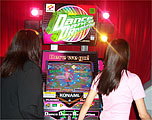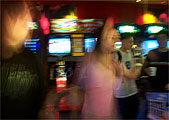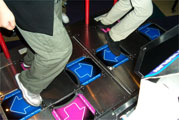
|
|
 | |
| Register NOW and receive special
membership benefits, plus a FREE subscription to
aMagazine. Check out what's in the current issue. | |
| home | channels | forums | chat | tools |
| aOnline > Channels > Lifestyle |
|
||
| ||||||||
Dancing the Night Away by Suyin So Oct 02, 2000 Carey Li is dancing, her arms weaving a design in the air as her legs nimbly follow an intricate routine of steps, leaps and turns. Her face flushes with excitement as the music stops and the gathered crowd applauds. Li's stage isn't a theater; it's an arcade. And her stage is a metal floor lit up with flashing arrows, set in front of a screen that blasts sub-par techno music. It's called Dance Dance Revolution (DDR), a video game which blends elements of Twister, Simon and karaoke. It's hot, it's flashy and it's addictive. The game is the latest obsession for Asian American youths like Li, 20, and her friend Christine Chao. Arrows on the screen map out a dance sequence, and would-be Paula Abduls match their steps to those on the screen in order to advance through the game. The DDR machine scores players based on accuracy; if you're perfect or close enough, you clear songs with titles like "Boom Boom Dollar" and "Brilliant2U" and advance to the next level. "When I play, I get a rush," says Li, a student at University of
Los Angeles, where there's a DDR machine on campus. Her roommate
pulled her onto the stage about six months ago and she's been a
dancing queen since. Part of the appeal, Li thinks, is the performance aspect. "You enjoy the attention," she said. "When you pass a song you feel exhilarated." Fanatics also cite as benefits the workout you get from jumping around frantically, as well as improved dance skills that Arthur Murray doesn't teach. Whatever the appeal, those who try it are almost invariably hooked. In Japan, where DDR is even more insanely popular, rumors circulate about people going broke from the game. After her first session, Li couldn't get the game out of her head.
|
||||||||



